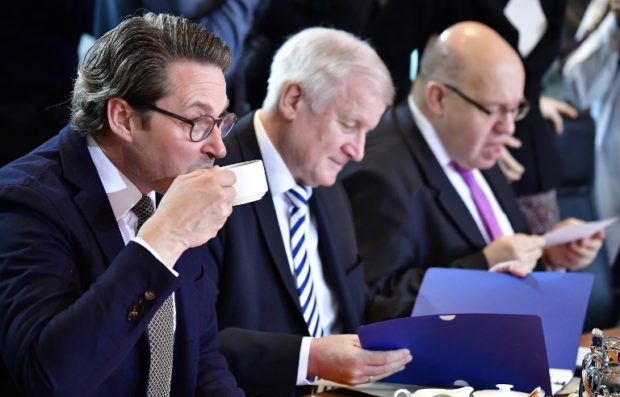Minister: Islam ‘not part of Germany’

German Interior Minister (center) stirred a political storm after he declared on Friday, March 30, 2018, that Islam was ‘not part of Germany. AFP
BERLIN, Germany — Chancellor Angela Merkel’s hardline new interior minister declared that Islam is “not part of Germany” in an interview published Friday, setting off a political storm two days into her fourth term.
Asked by the top-selling Bild daily whether the influx of Muslim migrants and asylum seekers to Europe’s top economy over the past several decades meant that Islam now belonged to the fabric of the nation, Horst Seehofer replied “no”.
“Islam is not part of Germany. Christianity has shaped Germany including Sunday as a day of rest, church holidays, and rituals such as Easter, Pentecost and Christmas,” he said.
“The Muslims who live among us are naturally part of Germany. But that of course does not mean that we, out of a false sense of deference, should sacrifice our traditions and customs.”
Merkel quickly contradicted her minister, saying that despite Germany’s Judeo-Christian roots, more than four million Muslims now made their homes in the country.
Article continues after this advertisement“These Muslims are part of Germany and with them, their religion, Islam, is just as much a part of Germany,” she told reporters after talks with Swedish Prime Minister Stefan Lofven.
Article continues after this advertisementDespite Merkel’s intervention, Seehofer’s comments are likely to prove divisive in the fledgling right-left “grand coalition”, which only came together when the reluctant Social Democrats (SPD) got on board after months of political paralysis.
Most of Germany’s Muslims are descendants of Turkish so-called “guest workers” invited to Germany in the 1960s and 1970s.
The community grew again when Merkel in 2015 opened the border to more than one million asylum seekers from war-torn Muslim-majority countries such as Syria, Iraq and Afghanistan.
‘Completely superfluous controversy’
The outspoken Seehofer, leader of the Christian Social Union (CSU), the Bavarian sister party of Merkel’s Christian Democrats, is new to the cabinet, which was sworn in on Wednesday.
His expanded interior super-ministry also covers “Heimat” or homeland affairs, intended to recapture claims to patriotism and national identity from the far-right Alternative for Germany (AfD) party, which won nearly 13 percent of the vote in September’s general election.
The premier of Lower Saxony, Stephan Weil of the SPD, accused Seehofer of sparking “a completely superfluous controversy” just as Merkel begins her new term.
The issue, however, has divided Germany for more than a decade.
Powerful conservative Wolfgang Schaeuble said in 2006 that Islam was part of Germany and Europe while he was serving as interior minister in Merkel’s first cabinet.
The comment provoked little reaction at the time but when Christian Wulff, then president of the country, revived the phrase in 2010, it touched off a heated national debate about what it means to be German.
Merkel has come down firmly on the side of inclusion, repeatedly stating that Islam and Muslims belonged in Germany, and vocally defending the stance at the height of the refugee influx.
In her comments to reporters Friday, Merkel said she supported the practice of Islam in Germany “on the basis of the constitution” and pledged her new government would continue a formal dialogue with the Muslim community started by Schaeuble in 2006.
Normally Seehofer as interior minister would chair the talks.
‘Quoted from our platform’
But the head of the Central Council of Muslims, Aiman Mazyek, said angrily that a minister who started work with such a “lack of solidarity” with minorities in Germany had “immediately disqualified” himself and acted “extremely irresponsibly”.
The anti-immigrant, anti-Islam AfD for its part welcomed the remarks, with its Saxony state leader Andre Poggenburg claiming that Seehofer had “quoted word-for-word from our platform”.
Bavaria is holding a state election in October, when the CSU is expected to face a strong challenge from the far-right.
Seehofer, the harshest critic of Merkel’s border policy within her conservative bloc, fought for and won an agreement to set a maximum target in the government coalition pact of around 200,000 new arrivals to Germany per year.
Most of those who came across the Balkans route in 2015 passed through Seehofer’s southern state of Bavaria, at times more than 10,000 a day, sparking a strong backlash in the region.
He has vowed to now as a federal minister take a tough line against convicted criminal migrants and speed up repatriations of rejected asylum seekers. /cbb